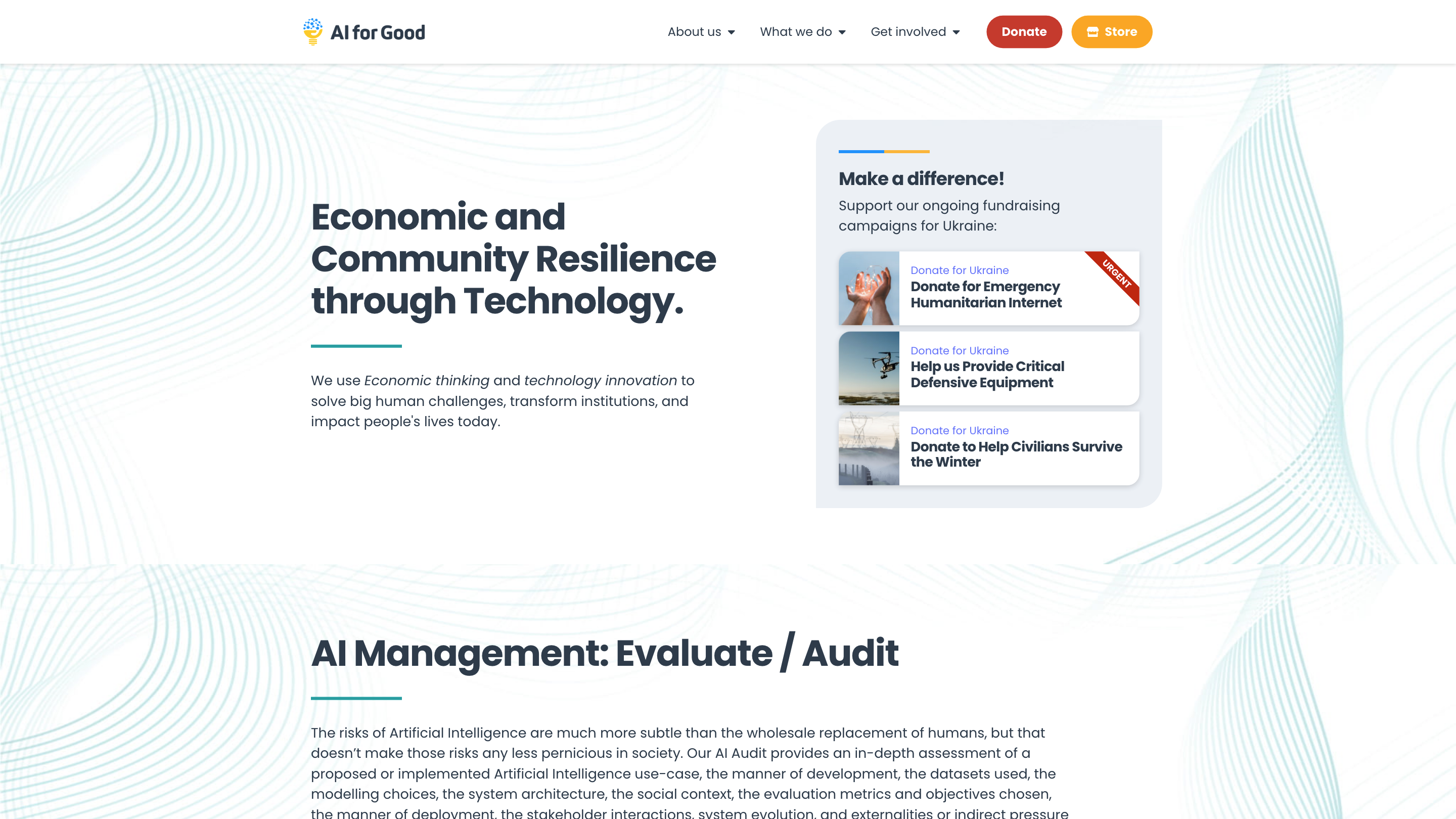AI for Good Foundation
Open siteBusiness Research
Introduction
Nonprofit using AI for social impact
AI for Good Foundation Product Information
AI for Good Foundation — AI for Social Impact is a nonprofit initiative focused on harnessing artificial intelligence and economic thinking to address large-scale humanitarian and development challenges. It partners with governments, NGOs, researchers, and communities to design, deploy, and evaluate AI-enabled solutions that improve resilience, governance, and well-being across vulnerable populations. The foundation emphasizes transparency, impact measurement, and ethical use of technology to ensure that AI serves the public good and accelerates progress toward sustainable development goals.
What it does
- Provides an integrated suite of AI-driven programs and platforms aimed at humanitarian aid, economic resilience, and policy alignment with SDGs.
- Develops and deploys practical AI tools for real-world impacts, including audits, personalized assistance, data-driven decision making, and evidence-based policy support.
- Focuses on both immediate relief (e.g., crisis response) and long-term systemic improvements (e.g., governance, education, data ecosystems).
Core Programs and Initiatives
- AI Audit and Management: In-depth evaluation of AI use-cases, including datasets, modeling choices, system architecture, deployment, stakeholder interactions, and externalities. Helps organizations manage AI risks and maximize positive societal impact.
- Eureka – The Intelligent Assistant for Refugees: An integrated, personalized assistant to simplify navigating bureaucracy, access services, and integrate into new communities.
- LifeForce Ukraine: A large-scale humanitarian aid matching platform providing real-time access to food, shelter, medicine, and healthcare across thousands of service locations with in-country support.
- Witness Ukraine: A war journal platform enabling civilians to record and share experiences to support justice and accountability.
- Economists for Ukraine: A global network of economists supporting sanctions, policy analysis, and rebuilding efforts.
- AI4Good Workstreams: AI for Education, AI for Policies, and AI Deployment initiatives that translate AI research into policy-ready, scalable solutions.
- SDG Data Catalog and Library: A repository of datasets and AI resources aligned with the Sustainable Development Goals to inform research, policy, and project design.
- Partnerships and Ecosystem Building: Engage partners across academia, industry, and government to co-create impactful AI solutions and policies.
How it works
- Identify societal challenges where AI can create measurable improvements.
- Develop, deploy, and scale AI-enabled interventions with a focus on user-centered design and governance.
- Conduct rigorous audits and impact assessments to monitor outcomes and adapt strategies.
- Build data infrastructure and open resources to enable transparency, collaboration, and replication.
- Engage communities and stakeholders to ensure relevance, inclusivity, and long-term sustainability.
Who it helps
- Vulnerable populations affected by conflict, displacement, poverty, and inadequate access to essential services.
- Governments and civil society organizations seeking evidence-based AI and data-driven policy solutions.
- Researchers and practitioners looking for open datasets, tools, and best practices in ethical AI for social good.
Safety and Ethics
- Emphasizes ethical use of AI, data privacy, and avoidance of harm, with governance practices to minimize risk and negative externalities.
- Promotes transparency, accountability, and community involvement in AI deployments.
Core Features
- AI Audit: In-depth assessment of AI use-cases, including data, modeling, deployment, and social impact analysis
- Refugee Support: Integrated intelligent assistant (Eureka) to navigate bureaucracy and access services
- Crisis & Humanitarian Aid: Real-time matching platforms and service delivery optimization (LifeForce Ukraine)
- Public Data & SDG Resources: SDG data catalog and open datasets for research and policy
- Policy & Education Innovation: AI for Education and AI for Policies to drive effective governance
- Community & Partnerships: Ecosystem collaboration with NGOs, policymakers, and researchers
- Transparency & Ethics: Governance frameworks and risk mitigation for responsible AI use
How to use (for organizations and partners)
- Identify a social impact domain where AI can drive measurable improvements.
- Engage with AI for Good to scope a project, ethical considerations, and data needs.
- Deploy an AI solution with governance, privacy, and accountability mechanisms.
- Audit outcomes and iterate to maximize positive impact.
- Share findings and resources to contribute to the broader AI for Good community.
